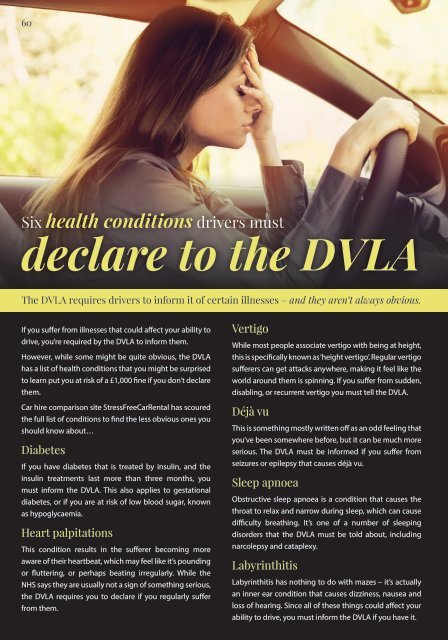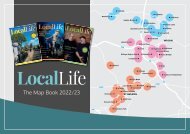Create successful ePaper yourself
Turn your PDF publications into a flip-book with our unique Google optimized e-Paper software.
60<br />
Six health conditions drivers must<br />
declare to the DVLA<br />
The DVLA requires drivers to inform it of certain illnesses – and they aren’t always obvious.<br />
If you suffer from illnesses that could affect your ability to<br />
drive, you’re required by the DVLA to inform them.<br />
However, while some might be quite obvious, the DVLA<br />
has a list of health conditions that you might be surprised<br />
to learn put you at risk of a £1,000 fine if you don’t declare<br />
them.<br />
Car hire comparison site StressFreeCarRental has scoured<br />
the full list of conditions to find the less obvious ones you<br />
should know about…<br />
Diabetes<br />
If you have diabetes that is treated by insulin, and the<br />
insulin treatments last more than three months, you<br />
must inform the DVLA. This also applies to gestational<br />
diabetes, or if you are at risk of low blood sugar, known<br />
as hypoglycaemia.<br />
Heart palpitations<br />
This condition results in the sufferer becoming more<br />
aware of their heartbeat, which may feel like it’s pounding<br />
or fluttering, or perhaps beating irregularly. While the<br />
NHS says they are usually not a sign of something serious,<br />
the DVLA requires you to declare if you regularly suffer<br />
from them.<br />
Vertigo<br />
While most people associate vertigo with being at height,<br />
this is specifically known as ‘height vertigo’. Regular vertigo<br />
sufferers can get attacks anywhere, making it feel like the<br />
world around them is spinning. If you suffer from sudden,<br />
disabling, or recurrent vertigo you must tell the DVLA.<br />
Déjà vu<br />
This is something mostly written off as an odd feeling that<br />
you’ve been somewhere before, but it can be much more<br />
serious. The DVLA must be informed if you suffer from<br />
seizures or epilepsy that causes déjà vu.<br />
Sleep apnoea<br />
Obstructive sleep apnoea is a condition that causes the<br />
throat to relax and narrow during sleep, which can cause<br />
difficulty breathing. It’s one of a number of sleeping<br />
disorders that the DVLA must be told about, including<br />
narcolepsy and cataplexy.<br />
Labyrinthitis<br />
Labyrinthitis has nothing to do with mazes – it’s actually<br />
an inner ear condition that causes dizziness, nausea and<br />
loss of hearing. Since all of these things could affect your<br />
ability to drive, you must inform the DVLA if you have it.


















